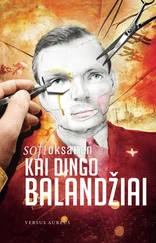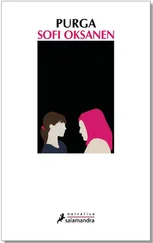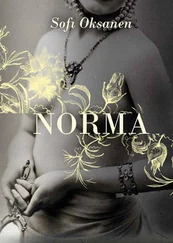She shifted her weight from one foot to the other, and Maria Kreel got up and went inside, closing the door behind her. Aliide didn’t know if it was time for her to leave or if she should wait, but then the old woman came right back out with a little brown glass bottle in her hands, wearing a grin that pulled the edges of her mouth inward. Aliide took the bottle. When she had closed the gate, the old woman whispered after her:
“That boy has a black mark on him.”
“Can I make it…”
“Sometimes you can, sometimes you can’t.” “So that he doesn’t see anyone but me?”
“Little girl, desperate dirt grows poor flowers.” Aliide left the farm at a run; her leather shoes flew with each long stride, and the bottle she’d got from the old lady warmed in her hands, though her fingers were cold and bloodless. Was there nothing that would stop the pounding pain in her chest?
Ingel was giggling in the yard, fetching water from the well, her braids undone and her cheeks red, wearing only her underdress.
Friedebert Tuglas’s Birdcherry Blossoms was waiting on Aliide’s bed. On Ingel’s bed, a man waited. Why was everything so wrong?
Aliide didn’t have time to test the effectiveness of Granny Kreel’s drink. It was meant to be mixed with coffee, but Ingel stopped drinking her coffee the next morning and ran outside to throw up. It had already happened, the thing the drink was supposed to prevent. Ingel was expecting a child.
Läänemaa, Estonia
From the Tumult of the Front to the Scent of Syrup
When the Baltic Germans were invited into Germany in the fall of 1939, one of the sisters’ German classmates from school and confirmation classes came to say good-bye, and promised to return. She was just going to make a tour of a country that she’d never seen before, and then she would come back and tell them what Germany was really like. They waved good-bye and Aliide watched as Hans’s hands wrapped around Ingel’s waist and moved toward her rear end. Their murmurs could be heard all the way into the front yard-Aliide pressed her teeth into the palm of her hand. Images of Ingel’s swelling waist and Hans’s body wrapped around Ingel’s tortured her endlessly, day or night, asleep or awake; she couldn’t see or hear anything else. None of the three of them took any notice of the furrows that were appearing on older people’s brows, furrows that didn’t go away but rather deepened, or how the girls’ father examined the sunset, searched it every evening from the edge of the field, smoking his pipe and staring at the horizon in search of a sign, studying the leaves of the maple tree, sighing as he read the newspaper or listened to the radio, then returned to the sound of the birds.
In 1940, the baby was born-Linda-and Aliide’s head felt like it was about to explode. Hans carried his daughter around, happiness shone in Ingel’s eyes, tears in Aliide’s, and Father’s eyes disappeared under worried wrinkles as he started to hoard gasoline and exchange his paper money for silver and gold. Waiting lines appeared in the village, the first lines ever in the country, and the shops were out of sugar. Hans didn’t warm to Aliide, even though she succeeded three times in putting her blood in his food, once an entire month’s worth. She should try pee the next time. Maria Kreel said it sometimes worked better.
Hans started to have quiet, somber discussions with Father. Maybe they didn’t want to worry the women of the family, so they didn’t talk about the troubling signs when the women could hear, or maybe they did talk about it, but neither one of the sisters attached any significance to what they said. Father’s wrinkled brow didn’t worry them, because he was an old man, from the old world, afraid of war. The Free Estonia students didn’t worry about that sort of thing. They hadn’t committed any crimes-what harm could come to them? It was only after the Soviet squads had spread out around the country that they started to fear that their future might be in danger. As she rocked her baby, Ingel whispered to Aliide that Hans had started to hold her tighter, that he slept beside her holding her hand all night long, and his grip didn’t loosen even after he fell asleep, which she thought was strange; he squeezed her as if he were afraid she would disappear from his arms during the night. Aliide listened to Ingel’s worries, although every syllable was like a dagger thrust in her heart. At the same time, she felt that the thing which possessed her was loosening its grip a little, and something else was replacing it-fear for Hans.
Neither woman could avoid the truth any longer when they went to the small square in town and heard the Red Army orchestra playing Soviet marches. Hans wasn’t with them, because he no longer dared to come into town, and he didn’t want the girls to go, either. First he started sleeping in the little room behind the kitchen, then he spent his days there, too, and in the end he went into the woods and stayed there.
Incredulous laughter raced from one town to the next, from village to village. The catchphrases- We’re fighting for Stalin’s great cause and We will liquidate illiteracy -provoked endless amusement. They couldn’t possibly be serious! The biggest joke of all was the officers’ wives, prancing around in fringed nightgowns in the villages, at the dances, in the streets. And what about those Red Army soldiers, peeling boiled potatoes with their fingernails like they didn’t know how to use a knife? Who could take a bunch like them seriously? But then people started disappearing and the laughter turned bitter. When they started loading up women, men, and children for slaughter, the stories were repeated like prayers. Aliide and Ingel’s father was snatched from the main road to the village. Their mother just disappeared; the girls came home to find the house empty, and yelled like animals. The dog wouldn’t stop waiting for its master; it sat next to the porch and howled with longing until it died. No one dared to go about their business outside, the land groaned under a flood of sorrow, and someone was added to the family of the dead in every grave dug in Estonian soil. The tumult of the front moved over every part of the country, and every part of the country cried out for help to Jesus, Germany, and the old gods.
Aliide and Ingel started to sleep in the same bed, with an ax under their pillow-their turn would come soon. Aliide wanted to go into hiding, but the only thing they hid was Ingel’s old Dollar-brand bicycle, which had a picture of an American flag on it. Ingel said an Estonian woman never abandons her house or her animals, even if they walk in with their uniforms and guns, a whole battalion of them. She would show them what the pride of an Estonian woman meant all right. So one sister stayed up while the other one slept, the Bible and a picture of Jesus keeping watch on the night table, and on those long nights Aliide stared first into the red-hot night and then at Ingel’s head, shining white, and wondered if she should run away by herself. And she might have done it if Hans hadn’t given her a task before he left: Protect Ingel-you know how. Aliide couldn’t betray Hans’s trust, she had to be worthy of him. That’s why she started to follow the news of the war from Finland with sharp eyes and keen ears, like Hans used to do. Ingel, for her part, refused to read the papers-she relied on prayers and stanzas from Juhan Liiv: Fatherland! I am unhappy with you, and more unhappy without you!
“Why don’t we leave while we still can?” Aliide suggested cautiously.
“And go where? Linda is too little.”
“I’m not sure about Finland. Hans thinks Sweden would probably be better.”
Читать дальше












